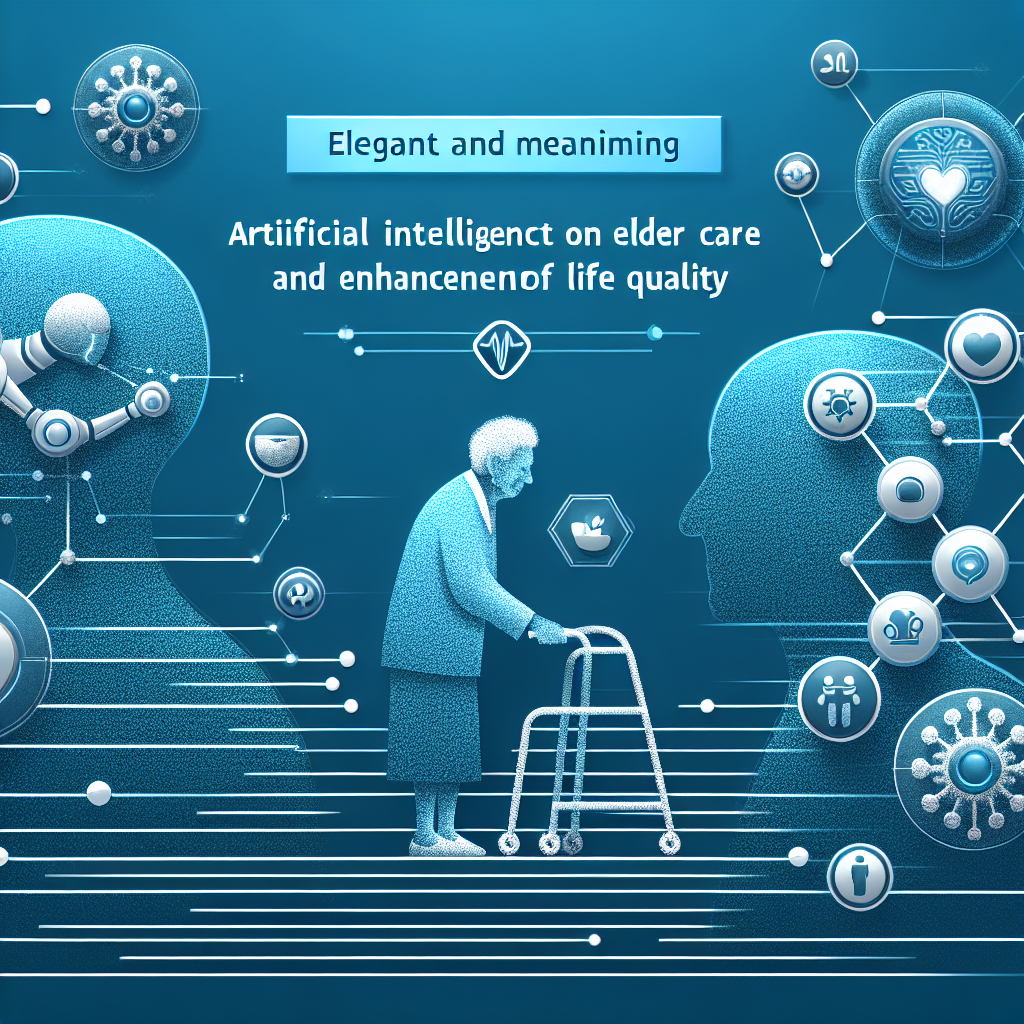Artificial Intelligence (AI) has made significant strides in recent years, revolutionizing various industries and sectors, including healthcare. One of the areas where AI is making a profound impact is in aging and senior care, by improving the quality of life for seniors.
As the global population continues to age, with the number of people aged 60 and above expected to reach 2.1 billion by 2050, the need for innovative solutions to support seniors’ health and well-being is becoming increasingly important. AI technologies have the potential to address some of the key challenges faced by seniors, such as loneliness, chronic diseases, and cognitive decline, by providing personalized and proactive care.
AI technologies can help seniors in various ways, including:
1. Remote monitoring and telemedicine: AI-powered devices and sensors can continuously monitor seniors’ vital signs and activities, providing real-time data to healthcare providers. This allows for early detection of health issues and timely interventions, reducing the need for frequent hospital visits.
2. Personalized care plans: AI algorithms can analyze seniors’ health data and medical history to develop personalized care plans tailored to their specific needs. This ensures that seniors receive the most appropriate and effective treatment options, leading to better health outcomes.
3. Social interaction: AI-powered chatbots and virtual assistants can provide companionship and support to seniors, helping to alleviate feelings of loneliness and isolation. These technologies can engage seniors in conversations, provide entertainment, and offer reminders for medication and appointments.
4. Fall detection and prevention: AI algorithms can analyze seniors’ movements and gait patterns to predict the risk of falls and alert caregivers or family members in real-time. This proactive approach helps prevent falls and injuries, which are common among seniors.
5. Cognitive assistance: AI technologies, such as voice-controlled assistants and smart home devices, can help seniors with cognitive impairments to manage daily tasks more independently. These technologies can provide reminders for medication, appointments, and other important activities, enhancing seniors’ quality of life.
6. Chronic disease management: AI-powered tools can track seniors’ chronic conditions, such as diabetes, hypertension, and heart disease, and provide personalized recommendations for managing their symptoms and improving their overall health. This proactive approach can help seniors better manage their conditions and prevent complications.
Overall, AI technologies have the potential to transform aging and senior care by providing personalized, proactive, and cost-effective solutions to support seniors’ health and well-being. By harnessing the power of AI, we can enhance the quality of life for seniors and enable them to age in place with dignity and independence.
Frequently Asked Questions (FAQs):
1. How can AI help seniors with dementia or Alzheimer’s disease?
AI technologies can assist seniors with dementia or Alzheimer’s disease by providing cognitive assistance, such as reminders for daily tasks, medication, and appointments. AI-powered devices can also monitor seniors’ activities and alert caregivers or family members in case of wandering or other safety concerns.
2. Are AI-powered devices secure and reliable for seniors?
AI-powered devices designed for seniors’ use are equipped with robust security features to protect their personal information and ensure data privacy. These devices undergo rigorous testing and certification to meet industry standards for reliability and safety.
3. How can seniors access AI technologies for aging and senior care?
Seniors can access AI technologies for aging and senior care through healthcare providers, senior living facilities, and home care agencies that offer AI-powered solutions. These technologies are designed to be user-friendly and intuitive, making them accessible to seniors of all technological backgrounds.
4. What are the potential drawbacks of using AI in aging and senior care?
Some potential drawbacks of using AI in aging and senior care include concerns about data privacy and security, the potential for algorithm bias, and the need for ongoing monitoring and oversight to ensure the accuracy and effectiveness of AI-powered solutions. It is important to address these challenges to maximize the benefits of AI for seniors.
5. How can family members and caregivers support seniors in using AI technologies?
Family members and caregivers can support seniors in using AI technologies by providing guidance and assistance in setting up and using these devices. They can also help seniors understand the benefits of AI technologies and address any concerns or questions they may have about using these tools.
In conclusion, AI technologies have the potential to improve the quality of life for seniors by providing personalized and proactive care solutions. By harnessing the power of AI, we can support seniors in managing their health and well-being more effectively, enabling them to age with dignity and independence. It is essential to continue exploring and developing AI-powered solutions for aging and senior care to meet the growing needs of our aging population.

